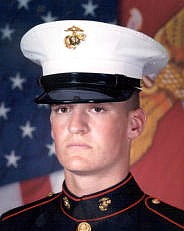A homecoming filled with grief (Ryan A. Miller)
 Frank Miller stood with his arms stiff at his sides, his fists clenched tightly, thumbs pointed down and forward as a Marine Corps honor guard brought the flag-draped coffin of his son toward him in measured steps.
Frank Miller stood with his arms stiff at his sides, his fists clenched tightly, thumbs pointed down and forward as a Marine Corps honor guard brought the flag-draped coffin of his son toward him in measured steps.At his side, his wife, Jeannine Maughmer-Miller, covered her mouth with her right hand as she sobbed, a finger of her left hand crooked inside a belt loop of her husband's trousers.
Once or twice, Miller trembled, but he held his composure. He kept his eyes forward, even as his son's casket passed by. His emotions did not betray him until it was rolled into the hearse. Then he dropped his head and cried, overcome by the finality of the moment.
Marine Lance Cpl. Ryan Adam Miller came home Thursday, the 52nd serviceman from the Houston area to die in combat in Iraq. The 19-year-old was from Pearland.
Unlike most tragic homecomings that pass silently with the family grieving among other family members and friends, Miller's return home bore a unique difference.
He was the son of beloved and highly regarded retired Houston police officers. His father worked in narcotics for more than 34 years, and his mother was a juvenile investigator for 25. Ryan planned to continue that tradition and eventually join that fraternity of officers.
"Many of us have known Jeannine and Frank for over 20 years, saw her kids throughout their childhood, so there's a lot of deep, strong emotions involved in this," said Houston police Lt. W.C. Staney, a supervisor with the juvenile sex-crime unit.
The loss reverberated throughout the force, he said.
Miller was killed in action near Barwana, Iraq. Marine Staff Sgt. Clifford Grimes delivered the news to the family Sept. 14.
Miller was home-schooled so he was able to graduate early and join the Marines after turning 18.
"He was top-shelf," said Griff Maxwell, a Houston police officer who worked in narcotics with Frank Miller. He and Frank coached their sons' Little League baseball team.
Ryan always batted cleanup and whenever he approached the plate with runners on, spectators in the bleachers would yell out, "It's Miller time," because he could be depended to drive runs home.
Like all the officers on the tarmac at George Bush Intercontinental Airport awaiting Miller's arrival, Maxwell wore a black cloth ribbon bordered in purple over his badge embroidered with the words, Nemo Me Impune Lacessit — Latin for "No one wounds me with impunity," a phrase also found on the Scottish Royal Coat of Arms.
Miller's parents did not talk to reporters. They grieved among friends and family. But the Houston Police Department allowed the media to witness Miller's homecoming because Miller was the son of two retired officers.
Dozens of officers joined Miller's family and friends in a caravan of five small buses with a police motorcycle escort. At the front was a white van carrying the Marine detail that informed the family of the death and whose job it was to carry the casket from plane to hearse.
They stood unshaded on the hot asphalt waiting for the plane to arrive from Philadelphia carrying Miller's casket.
Among them was Grimes.
"Words really can't express what you're about to do to a family," said Grimes, referring to the task of delivering the news to the family.
This was Grimes' ninth detail since the war started. All but Thursday's had been in Colorado.
"You bring this home with you," he said. "It's not anything you can leave at the office, by any means. It stays with you when you go home and remains with you for a long time afterward."
As Continental Flight 177 approached the gate, the jetliner was flanked by two emergency water trucks firing arching streams from their water cannons, an honor usually reserved for airline pilots but one that was extended to Miller.
Aboard the plane, the pilot asked passengers to remain in their seats in respect for the fallen Marine until his casket was unloaded. No one moved.
Randy Thomas, a Philadelphia consultant for IBM, said the mood on the aircraft was emotional and somber. From the windows, the passengers could see the family and officers.
"It's very sad, a waste," Thomas said. "People were very respectful and appreciative. When (the service members) got off the plane, there was a very respectful round of applause."
A line of at least 30 police officers and U.S. customs agents lined the path from the plane's cargo door to the hearse as Marines removed the casket.
Few held back emotions, but the sound of their grieving was drowned out by the engines of passing jets and news helicopters hovering overhead.
Frank Miller wore a bright-red shirt with the letters USMC emblazoned in gold letters over his heart. On his lapel, he wore a Gold Star pin signifying the loss of a son or daughter in war.
He and his wife embraced the casket as it was placed in the hearse. It was the closest they had been to Ryan since he left for the war.
When they stepped back, they left their tears on the flag that covered their son.
From the Houston Chronicle

<< Home